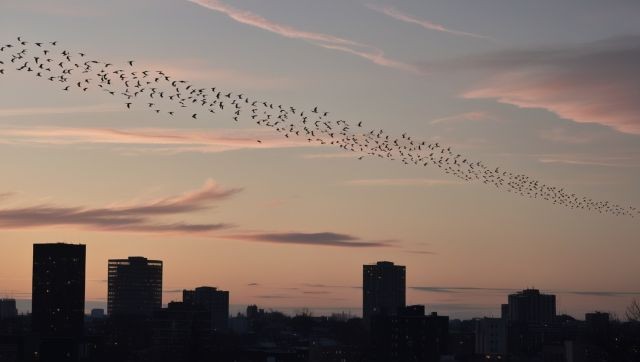Latest News
- NC AG Jackson: FEMA's Cut to BRIC Program Jeopardizes Public Safety
- Your Ultimate WNC Weekend: Music, Nature & Fun for All Ages (July 25-27, 2025)
- Police Investigate Assualt on Bycyclist in Asheville
- UPDATE: I-26 East Lane Near Chimney Rock Road Reopens After Pavement Failure
- Rutherford County Inmate Hospitalized

 WNCTIMES
Serving The Citizens of Western North Carolina Since 1995
WNCTIMES
Serving The Citizens of Western North Carolina Since 1995 NC Lights Out Initiative to Protect Migrating Birds
A recent study has revealed that the estimated death toll of birds due to building collisions significantly underrepresents the true scale of the problem.
NC Lights Out September 6 - October 6, 2024
Migrating birds, especially those traveling at night, are particularly vulnerable. In response, North Carolina towns and cities are increasingly adopting Lights Out programs, aimed at making the night skies safer and darker for these migratory species. The latest town to join the initiative is Matthews, where local advocacy led by Mecklenburg Audubon resulted in a new resolution to dim building lights during peak migration periods. The Growing Movement Across North Carolina
Since the fall of 2021, advocacy by local Audubon chapters has led to four cities in North Carolina officially adopting Lights Out policies, with two additional cities seeing individual buildings voluntarily go dark to protect birds. The momentum is evident, as communities increasingly recognize the importance of these measures in reducing bird fatalities. Cities and Towns Leading the Way
Several North Carolina cities and towns have already committed to implementing Lights Out policies, including: Asheville
Asheville
Greensboro
Matthews
Raleigh
Chapel Hill
Cary
Durham
These policies are part of a broader effort to protect the millions of birds that pass through North Carolina during their spring and fall migrations.
The Dangers of Nocturnal Migration
Migrating birds often travel at night, using the stars to navigate. However, the bright lights of urban centers can confuse them, causing disorientation and exhaustion. These birds may end up colliding with buildings, which can be fatal. The Lights Out initiative aims to mitigate this risk by reducing unnecessary lighting during critical migration periods, helping birds stay on course and reach their destinations safely.
How You Can Help
You can play a part in protecting migrating birds by participating in the Lights Out initiative. From now through November 30, consider turning off or dimming your outdoor lights, especially if you live in an area with a high density of migratory bird traffic. Every effort counts in making the skies safer for these vulnerable species. By embracing the Lights Out initiative, North Carolina is taking meaningful steps to protect its avian populations. As more cities and towns join the movement, the future looks brighter—or in this case, darker—for our feathered friends.
When you subscribe to the blog, we will send you an e-mail when there are new updates on the site so you wouldn't miss them.
About the author
Remembering Connie Francis: A Voice of Enduring Strength
Connie Francis passed away at 87, closing the chapter on a life lived fully, loudly, and often, defiantly. Her voice, instantly recognizable on hits like "Stupid Cupid" and "Where the Boys Are," was j...
Monday Moods: Think About Beginner-Friendly Hike with Big Rewards!
Hey friends! Happy Monday from right here in beautiful Western North Carolina! Mondays can sometimes feel like trying to push a boulder uphill, especially when you're still dreaming of the weekend's m...
Fireflies: Tips to Help Them Thrive
There's a certain magic to a Southern summer night. You know the one: where the air hangs heavy and warm, cicadas hum their twilight song, and then, slowly, one by one, tiny lights begin to wink on. F...
Catch the Cosmic Show: The Thunder Moon (Buck Moon)
Get ready for a celestial spectacle! This Thursday, July 10, 2025, marks the arrival of the first full moon of the astronomical summer, often known as the Thunder Moon or Buck Moon. If you're in Weste...
Beyond the Boom: How Fourth of July Fireworks Terrify Our Pets and Impact Our Community
The Fourth of July. For many of us, it's a weekend of barbecues, sunshine, and dazzling fireworks lighting up the night sky. But for our beloved pets and the unseen wildlife around us, it's often a we...
 How to resolve AdBlock issue?
How to resolve AdBlock issue? 